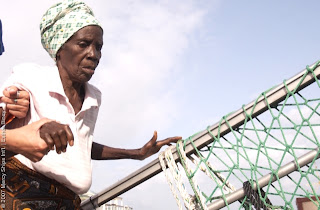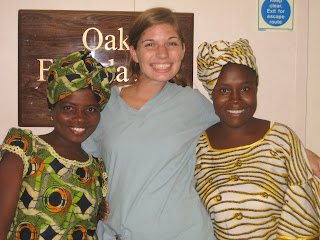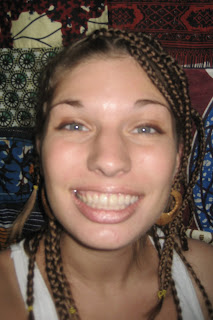
Hi friends,
I hope this letter finds you doing well. I have to tell you, this one's kind of a downer. If you can't handle it, skip to the last section dated from the seventh for the good stuff.
6.29.07
On my way down the dock to the eye clinic today I passed two women who were crying. When I asked how I could help them, one of the women told me "Keopa is sick," and pointed to the little girl on her back. Keopa is a toddler with limp limbs and pale skin. They pointed to a growth on her back. "She does not eat, she does not sleep, and no one in our country has the right machine to help her. We have no money to take her to America." I admire these women for their commitment to Keopa. Providing care for even a healthy child can be a difficult feat in an impoverished nation. Unfortunately, Mercy Ships was unable to help Keopa. We are only equipped to do certain surgeries, and Keopa's needs did not fit into that bracket. We referred her to a local clinic. The ladies were eager to allow me to pray for Keopa. I promised them that I would tell my friends and family home of Keopa's needs, and ask all of you to do the same. Please remember Keopa in your prayers.
After meeting Keopa, I spent today working in the admissions department for the eye clinic. We called patients into a tent on the dock one at a time to obtain their past medical history and get vital signs before sending them to the operating room to have their cataracts removed. Every now and again patients and their family members in the waiting area would break into song, singing and clapping their hands in unison. It was beautiful music to our ears as we went about our chores. And as much as my heart breaks for the living conditions and financial situations of the Liberian people, they have something huge that we, as Americans, have lost hold of. They are rich in community. I picture a group of Americans sitting in a waiting room - we read magazines, listen to our i-pods, text on our cell phones. We don't dare make conversation with the person in the seat next to us, much less join together in song with perfect strangers. Maybe if we truly understood how good we have it we'd perk up a little.
7.1.2007
A Liberian woman named Sando from the church I've been going to invited my friend Crystal and I to her house for lunch on Sunday. After waiting an hour after church had come to a close for the torrential rain to slow down, we set out for Sando's home. We laughed together as we dodged many puddles on our thirty ish minute walk deeper into the residential villages of Monrovia. Sando was proud to share her city with us, and we were glad to learn about it. On the way there we passed a herd of goats, on the way home we would pass a herd of cows! We're not in Kansas anymore…
We were greeted by a group of children who were playing in Sando's yard. As Sando opened the door to her one room home she told us "My house is your house. You are welcome here anytime." She made her way over to the window and opened the shade. Her home lit up as the sunlight poured in. The walls were a beautiful deep shade of teal. The wrought iron windows held so much character. The structure of the building was solid and promising in comparison to many around it. There was a stench in the air, a common Liberian rainy season muddy stench. But other than that, Sando's home looked rather desirable. Small, but desirable. I was glad to know that Sando has a comfortable home. And selfishly, I was glad to not be afraid to sit down.
So we sat. And we talked. We compared cultures. We compared lifestyles. We compared professions. Sando has done a lot of traveling in her career, as well. She tells me that she works in audio recording translating the Gospel of Christ into native tongues reaching those who have never heard.
Sando uncovered two bowls – one containing rice and the other a green sauce containing vegetable pieces. She passed us each a spoon to dig in. My belly told me to hold off on the food, but I could not insult my new friend. "Bless this food to our bodies," takes on a whole new meaning when you're not sure exactly what it is that you're eating. She pulled two cups out of the cupboard for us, then washed them in a bucket that was collecting a water leak from the ceiling. I knew we weren't supposed to drink the local drinking water, much less the leaking rain water, but I didn't want to insult my new friend. I was a thankful that Crystal put her foot down when it came to the water. She explained to Sando that our bodies are used to different kinds of water, and that if she visited the US our water might make her sick, too. With a smile, she sent the kids outside to get sodas for us.
When our meal was complete, Sando presented both Crystal and I with several yards of beautiful fabric. It was the eyelet kind – the fancy stuff I avoided in the market because it is the most expensive. What an honor. But could we really accept? Sando insisted. I hope to give Sando something in return, but am not sure what. Like everywhere else in the world, the women in Liberia talk. It is important to me that the Liberians do not feel like they need to have something to offer in order to befriend the Mercy Ships volunteers, which can be common in impoverished communities. I also wouldn't want them to befriend us in hopes of receiving gifts. I want to get to know Sando - to hear her stories, to encourage her, to pray for her. I do not want material things to be central in this. Maybe you could pray for my friendships with the Liberian people.
The Liberians seem to think of us as being wealthy because of the color of our skin. Little do they know we are volunteers. In the markets they greet us with the words "Mercy Ships!" and mark their prices up with a smile, often five or ten times what a native would pay. Liberia is a war torn country that has become very reliant on handouts from international non-governmental humanitarian organizations (NGO's) trying to enable the country to get back on it's feet. A typical African wage is about three American dollars per day, which makes me think that just a little bit of my money could go a much longer way in the hands of a Liberian than in my own. But giving them money could set a negative precedent. Because the ship only docks in each country for a short term period, our mission here is to empower people, not to create dependance. For instance, rather than handing out food, we have an agricultural team that teaches natives how to grow their own crops. Also, because in a nation as corrupt as Liberia the money that people do have is often spent on the wrong things, putting money in the wrong hands could often be more harmful than not giving at all. I pray that God would show me if and when it is beneficial for me to give money to the Liberians.
7.3.2007
So I'm sitting on deck seven of the Africa Mercy, struggling to pull my thoughts together after watching a documentary called "An Uncivil War" on the brutal battle in Liberia that only came to an end a couple of years ago when the UN finally stepped in in it's largest peace keeping effort in history. I overlook the UN base, which is only hundreds of feet from our ship, located in the Freeport area of Monrovia. The Freeport gate, which we have to walk through to get from the ship into town, was shown in the film as one of the bloodiest areas in the war. If I were to walk to the Port side of the ship during daylight hours I could see the skyline of Monrovia's downtown area. Unfortunately these monumental buildings cannot be seen at night because they are merely shells. The insides of most of them were blown out during the war and no electricity remains to light them up. Some are now occupied by squatters, some remain desolate. Over half the country was displaced from their homes while fleeing the rebels. The bridge we cross over into town in still plagued by hundreds of bullet holes in the railings on either side.
 [Blown out buildings downtown]
[Blown out buildings downtown] [Bullet holes in a light post]
[Bullet holes in a light post]Any heartache I have felt in my twenty-four years of picket fence life pales in comparison to what these people have endured. Imagine seeing the severed bodies and displaced parts of your friends, family, and neighbors lining the streets of your hometown. Imagine living in a country where rape was outlawed only three years ago and women are just beginning to exercise control over their own bodies; where boys were recruited to become child soldiers well before age ten and still wander the streets aimlessly with no place to call home. I am here. I am in it. Yet I do not know that I am capable of grasping the depths of what the Liberian people have experienced. I have been excused from these everyday tragedies from one reason - because I was born into middle class family in a wealthy nation. How unfair.
I am searching to find my place in all of this. Was I called to Liberia to give back for these three months, or is this just the beginning? Please pray that God would use me to the fullest each day here and direct my path for the future. And I imagine that my parents are squirming after reading this. My grandparents, too. Things are so so much better here now that the war is over, especially with the UN being so close. But they worry. I'd be especially thankful if you could say a prayer for them today, too.
7.7.2007
If you're still reading, I'm glad you persevered. If you're jumping back in for the good stuff, that's okay, too. Here goes.
So I'm working the night shift on the Africa Mercy, sitting in one of the ship's hospital wards filled with seventeen adorable sleeping Liberian women. Most of them had surgeries done last week to correct their vesicovaginal fistulas, the majority of which have been successful! Most of these women, who were previously society's outcasts because they continually leaked urine, will leave the Mercy Ship healed. Some are still having issues to work through. A few are developing infections and a few are still leaking. Please pray for these ladies.
When I say the patients are adorable, I mean they are ridiculously adorable. They are little, most about five feet. Their names range from simple ones like Mary and Mama(!) to more complex ones like Nyotongue and Ghango. The ladies were timid in their first few days here, probably because of fear. Socializing has not been a normality in their lives, some for many years. Also, so many things on the ship are brand new to them. For some this is their first time seeing white people, their first time in an air conditioned building, their first time on a boat, their first time up a flight of stairs and across a gangway, their first time being polked and prodded the way patients are in hospitals. But now that they are recovering from their surgeries and feeling more comfortable here they are coming out of their shells.
We communicate in loud, simple, pronunciated words because of the difficulty understanding each other's accents. We smile a lot as we mistake one another's words. If one woman cannot understand what I am asking her, chances are those in the beds around her willl step in and play interpreter, and next thing you know it's taken seven people to communicate whether or not she has had a bowel movement today. (TMI. Sorry. Such is life in the medical field.) Once meds are given, baths are taken, and incision care is complete, the ward turns into a social arena for these happy women living in their newly healed bodies. There are times when it looks more like a slumber party than a hospital in here! Most of our patients do not read or write. So what else do you do to pass the time in a hospital? Color. Knit. Paint nails. Sing. Laugh. Most of them have catheters in their bladders, and they carry the bags collecting their urine around like purses as they wander around the room visiting with their new friends. Tonight they were a captive audience as I read to them from a story book about Moses dividing the red sea. This is by far my most entertaining nursing gig yet!
It seems that most Liberian people are well versed in the Bible and African worship songs. A couple of days ago I was fortunate to catch the patients outside on the deck outside worshipping God. They shared their stories about the shame they've endured because of their medical conditions and thanked God for healing their bodies. Again, there was singing, clapping, and a little bit of dancing. Can't get too crazy with a catheter in! I am thankful to be a part of these women's journeys.





Wherever you are today, I am sure this letter leaves you feeling a little bit more grateful than before for everything that surrounds you. Soak it up.
"This existence is to be saturated with life." --- Justin Garwood
Much Love,
Lindsay

No comments:
Post a Comment